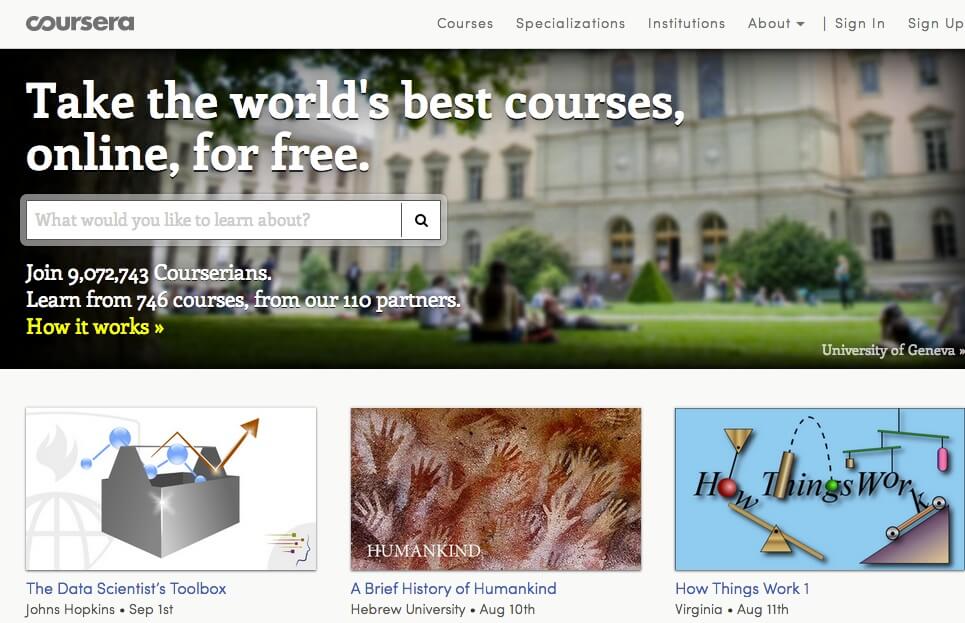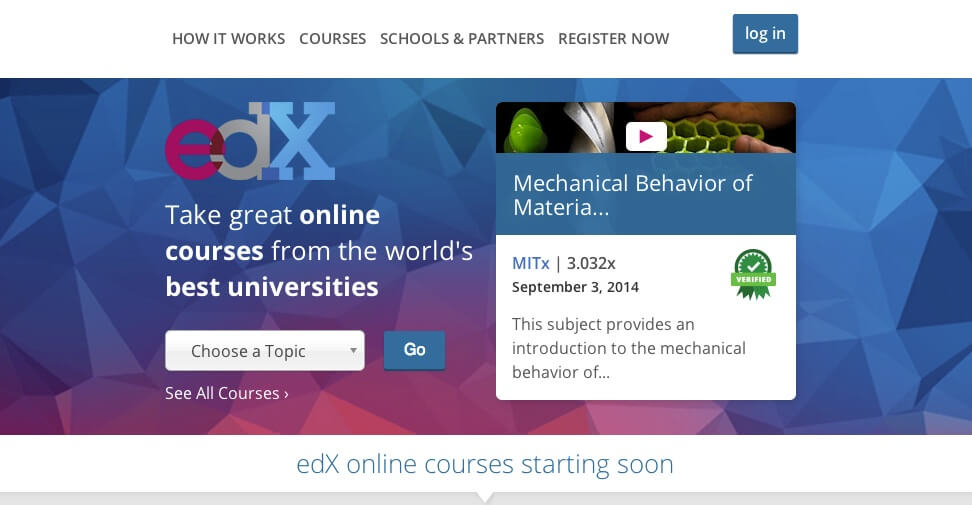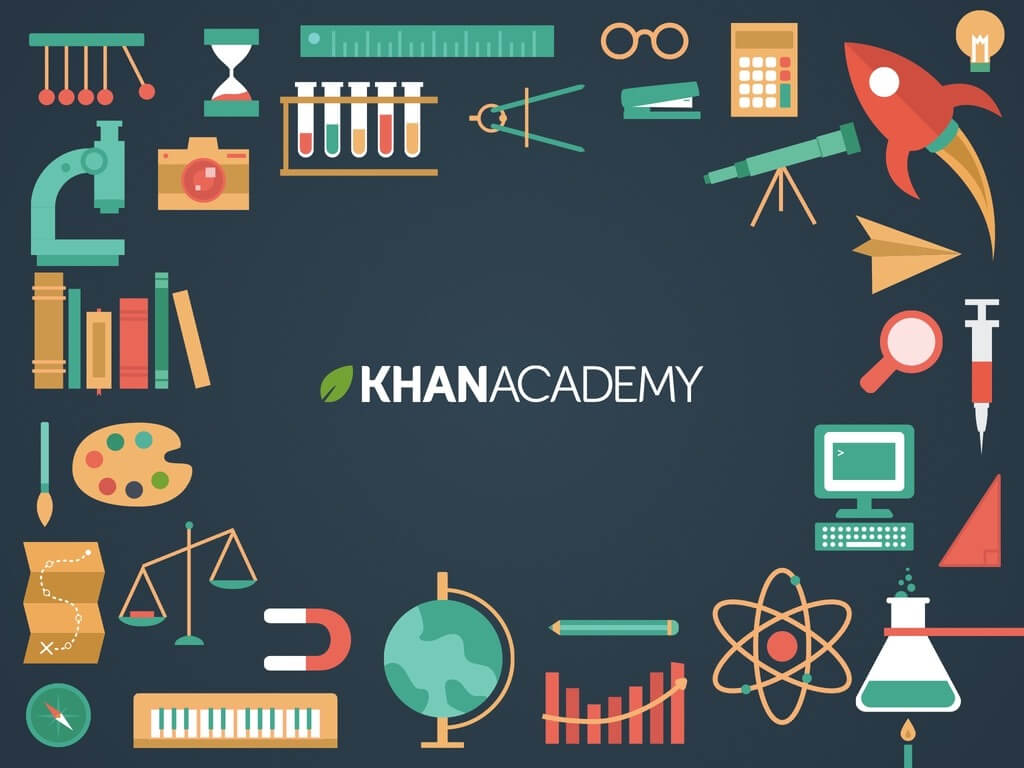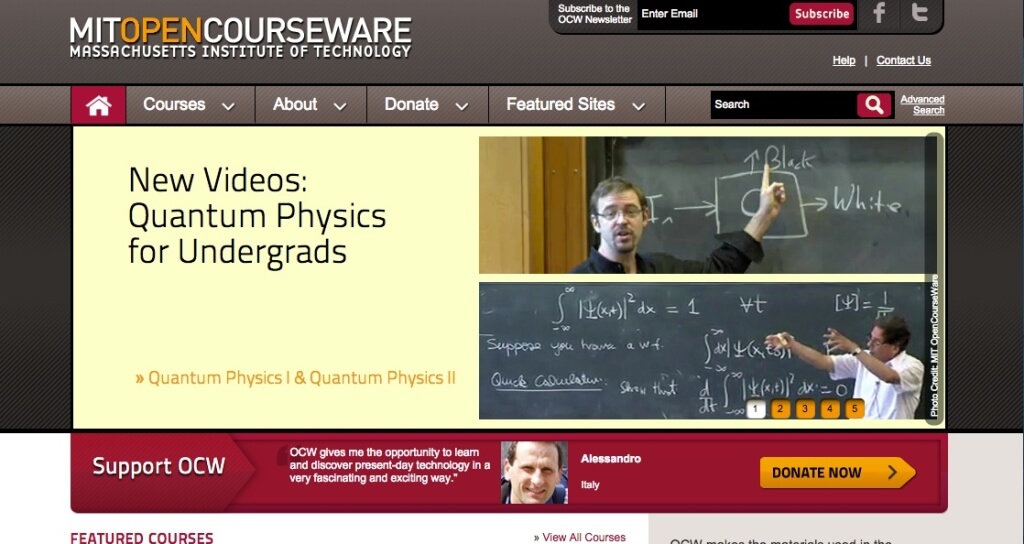One of the biggest benefits of the Internet is the huge amount of information we all have available at our fingertips. You can use this information to learn more and get a better chance at getting one of the best jobs.
Whether you're five or 95, the internet has a lot to offer. Particularly when the topic is education, the resources on the internet are endless. Best of all, many high quality sites are completely free. Before you dive in, you should know that there are even easier ways to make money online if you know where to look.
To start your search, we've compiled 9 free online programs to help you learn how to make money.
The 9 best sites for free online education
Skillshare
Skillshare is a sleek learning platform with an equally well-designed app and thousands of courses. The video content is excellent quality, which is only fitting for a platform with name-brand instructors from the worlds of media, design, art, and technology, as well as leadership and entrepreneurship.
Skillshare distinguishes itself by offering hands-on projects and community-based learning. It's easier to stay motivated when you have a group of like-minded learners accessible right from your phone. Skillshare offers full access to its courses for free during the free trial period for its membership.
Coursera

Coursera.org is one of the leading providers of MOOCs – massive open online courses. It is a website that partners with universities and organizations around the world to bring a wide variety of topics and perspectives to one searchable database. This gives the site an extremely wide range of in-depth courses.
Some Coursera courses provide certificates of completion to recognize that you passed the class, but you will likely need to pay a fee. If you enjoy learning in a structured classroom-style environment and want to do this at home, Coursera is a great place to start.
LinkedIn Learning
LinkedIn Learning is a boon for job seekers and working professionals alike, with over 20,000 online courses taught by experts in the field. The first month of this paid subscription service is free and presents a great learning opportunity. If you already have a LinkedIn Premium Core subscription, LinkedIn Learning access is included for free.
Courses are delivered by high-quality video and range in expertise from beginner to advanced. As you complete courses relevant to your field, you can add certificates to your LinkedIn profile and demonstrate to prospective employers that you are proactive about learning.
Signing up for LinkedIn Learning also makes it easy for you to work toward shifting to a new career with their structured Learning Paths.
Skill Success
/images/2021/04/26/skill-success-screenshot.jpg)
Skill Success offers over 4,000 video-based courses that are designed to help you advance in your career. The topics range from Business to Technology to Career Development. Most of the content is geared toward the beginner level. This learning platform is also known for its introductory creative courses, such as piano and photography.
You can sign up for a class for free when you subscribe to the platform's newsletter.
edX

Another great option for free online education is edX. It offers over 4,000 full online courses with teachers, discussion boards, quizzes, and so on, but it tends to focus on (and excel at) courses in math, the sciences, and engineering. Free audited classes, though, will not have access to graded assignments or certification. Bringing together courses from many different schools, the site has impressive, quality information for everyone.
Khan Academy

Completely free, Khan Academy offers a usable, well-organized interface. Also curating many courses from around the web, Khan Academy offers impressive depth on many different subjects. The lectures are short and share a handful of information at a time, but they build on each other as you progress.
Udemy

Udemy is an online institution that offers courses taught by leading experts. Udemy's free courses are similar in concept to Coursera's, but additionally allows business account users to build custom courses from lessons. Working with many top professors and schools, the site mixes the customizable platform of other sites with a heavy emphasis on top quality content. However, this is a site that mixes free and paid content.
MIT OpenCourseWare

MIT OpenCourseWare is a treasure trove of course material from the Massachusetts Institute of Technology; it provides lectures, lecture notes, homework assignments, sample tests, and many other materials from the actual courses at MIT. MIT OpenCourseWare stands out from the pack if you're looking to learn more about science, computer science, and engineering topics, as MIT is among the top universities for those subjects.
Codecademy

Codecademy is a website dedicated specifically to teaching coding. Codecademy teaches you how to write the code necessary to develop interactive websites using the most useful programming languages – HTML, CSS, JavaScript, Python, Ruby, and PHP – and does it within the browser using interactive tools.
Codecademy features a centralized dashboard where you can monitor your progress, plus organizes lessons into complete modules. This lets you learn an entire language without needing to pick the next course manually.
Bonus: 8 sites offering free online courses
If you're looking to keep busy by engaging your mind, here are a number of bonus sites offering free online learning experiences right now.
- Check out the free collection of ten-minute or less educational videos at TED-Ed.
- Explore resources from top universities on Alison.
- Get started with some coursework on Academic Earth.
- Discover free online courses at Class Central.
- Learn to cook with Milk Street Cooking School's online lessons.
- Visit a museum for free with Google Arts & Culture.
- Open Culture highlights 1,700 lectures, videos, and podcasts from universities around the world.
- Stanford Online is a great site for world-class courses, some of which are free.
FAQs
How effective is online learning?
A study by the National Research University Higher School of Economics found that online learning can be just as effective as traditional learning in the classroom. Student participants were separated into groups that studied the same materials in different ways, emphasizing in-person instruction versus online classes.
Overall, the average level of knowledge gained from each group was the same, though the average grade for assessments was higher for online students. This type of study demonstrates how effective online learning and professional development can be, especially when considering the lower cost of online classes compared to traditional classes.
What are the pros and cons of online learning?
The pros of online learning can include:
- Flexibility: Online courses can be done from just about any location and typically at your own pace.
- Affordability: Cut out a lot of the costs of attending a college or university, such as room and board wherever the school is located, and you can end up with a less expensive load of classes. Online classes from traditional schools may cost the same as the in-person equivalents, though.
- Individualized: You learn how you want to learn with online classes instead of being grouped along with everyone else. Because all the information is readily available to you online, you can adjust how you want to study and learn each day.
The cons of online learning can include:
- Social interaction: This isn't a con for every student, but you'll have a lot less social interaction with your instructors and other students in most online classes.
- Distractions: Learning from home or elsewhere can be distracting. You may need more self-discipline to stay focused on studying and completing assignments when you aren't attending in-person classes.
- Availability: Online classes aren't available for every subject, which is unfortunate if there's a specific class you need or want to take.
Do employers like online degrees?
Whether an employer likes online degrees compared to traditional degrees depends on the employer. Getting an online education is a lot more common these days and can be convenient for students who don't have other options due to either time or money constraints. Plus, there's really nothing that makes an online degree from a reputable institution any less credible than a traditional college degree.
In addition, a wide variety of employment opportunities don't necessarily demand a degree. You may be able to complete online training that fits the requirements for certain jobs. You may be able to qualify for designer, developer, or programmer jobs if you have the experience and certifications required. For example, finishing a coding boot camp could get you in the door for an entry-level programming position with the skills you acquired.
What does a virtual classroom look like?
Every virtual classroom will look a little different depending on what platform you're using. However, you can typically expect there to be a login screen to get into the classroom, a discussion space where instructors and students can interact, and a virtual whiteboard where the instructor can post slides, video lectures, and other teaching materials. Some virtual classrooms will have live video meetings and others will not.
Virtual classroom platforms will typically have different sections for educators and students. Teachers will have areas where they can upload all the materials they need and students will have areas where they can access their assignments and other resources. The exchange of assignments may sometimes be done privately just between the teacher and each individual student. Other times students may post to a group area so they can all learn from each other.
Methodology
To choose the best sites for free online education, we identified websites that offer at least some free learning programs. We compared topics, certificate options, course options, and other resources. We did not include all possible options.




/images/2018/01/23/navina-side-hustle-mid_MPfEDfV.jpg)

/images/2019/12/06/smart_strategies_to_save_money_on_car_insurance.jpg)
:format(webp)/images/2015/09/28/office-620817_1920.jpg)
/authors/ivanafinancebuzz.png)
/authors/jess_ullrich.jpg)
 Add Us On Google
Add Us On Google
/images/2021/04/26/skill-share-screenshot.png)
/images/2021/03/31/linkedin-learning-screenshot.jpg)
/images/2021/04/21/adobestock_192812280_1200x628.jpg)

/images/2019/12/06/smart_strategies_to_save_money_on_car_insurance.jpg)
/images/2025/01/28/adobestock_628402894_1.jpeg)
/images/2024/09/04/adobestock_669069249_editorial_use_only_1.jpeg)
/images/2020/03/02/tattoo-woman-bar.jpeg)
/images/2020/12/21/smiling-couple-looking-at-laptop-screen.jpeg)
/images/2023/11/17/woman-watching-netflix.jpg)
/images/2023/07/31/person-typing-on-laptop.jpg)
/images/2020/03/27/smiling-man-working-from-home.jpeg)
/images/2019/10/23/x_weird_jobs_that_pay_surprisingly_well.jpg)
/images/2019/07/16/ways-to-earn-more-money-right-now.jpg)
/images/2020/07/16/man-working-from-home.jpg)
/images/2023/05/08/female_teacher_holding_digital_tablet.jpg)
/images/2023/10/02/young-employee-arguing-with-senior-boss.jpeg)
/images/2023/12/29/adobestock_680139154.jpeg)
/images/2023/03/16/pet-sitting.jpg)
/images/2022/06/24/hands_put_together_to_show_unity_and_cooperation.jpg)